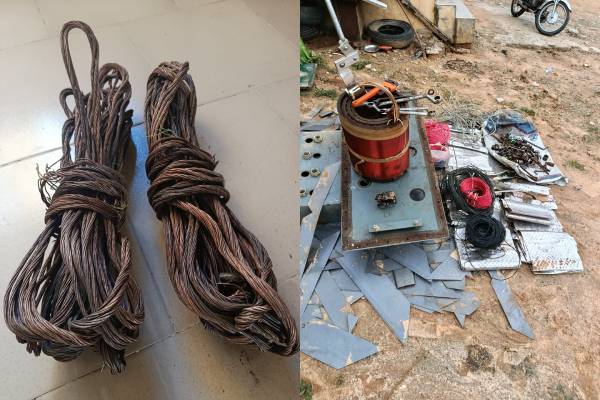In a bold move to reposition its hospitality and tourism sectors, the Kwara State Government has announced the formation of a taskforce aimed at revitalizing these critical industries. This initiative, unveiled by the state’s Commissioner for Business, Innovation, and Technology, Damilola Yusuf-Adelodun, during a press briefing in Ilorin, underscores the government’s commitment to harnessing the untapped potential of Kwara’s tourism assets and hospitality industry to drive economic growth, job creation, and sustainable development. The taskforce is expected to address longstanding challenges, streamline operations, and create a vibrant ecosystem that will attract both local and international tourists while enhancing the state’s revenue base.
Background: The Need for Reform in Kwara’s Hospitality and Tourism Sectors
Kwara State, located in Nigeria’s North-Central region, is endowed with a rich tapestry of cultural, historical, and natural attractions. From the iconic Owu Falls, one of Nigeria’s highest and most spectacular waterfalls, to the historic Esie Museum, which houses the largest collection of stone figures in sub-Saharan Africa, Kwara has the potential to be a major tourism hub in Nigeria. Additionally, the state boasts landmarks such as the Sobi Hill, the Ilorin Emir’s Palace, and the annual Durbar festival, which celebrates the region’s rich cultural heritage. Despite these assets, the hospitality and tourism sectors in Kwara have faced significant challenges, including inadequate infrastructure, poor marketing, regulatory bottlenecks, and a lack of coordinated efforts to promote the state as a tourist destination.
The hospitality sector, which includes hotels, restaurants, and event centers, has also struggled with issues such as inconsistent service standards, limited investment, and inadequate training for personnel. These challenges have hindered the sector’s ability to compete with other states like Lagos, Abuja, and Cross River, which have made significant strides in promoting tourism and hospitality as key drivers of their economies. Recognizing these gaps, the Kwara State Government, under the leadership of Governor Abdulrahman Abdulrazaq, has prioritized the reform of these sectors as part of its broader economic diversification agenda.
The Taskforce: Composition and Objectives
The newly established taskforce is a multi-stakeholder body comprising experts from the public and private sectors, including representatives from the state’s Ministry of Business, Innovation, and Technology, tourism associations, hoteliers, and other relevant stakeholders. The taskforce is chaired by a seasoned professional with extensive experience in tourism and hospitality management, though the specific identity of the chairperson was not disclosed during the announcement. The inclusion of private sector players is a strategic move to ensure that the reforms are practical, industry-driven, and aligned with global best practices.
The primary objectives of the taskforce include:
Policy and Regulatory Reforms: The taskforce is tasked with reviewing existing policies and regulations governing the hospitality and tourism sectors in Kwara State. This includes streamlining licensing processes, addressing taxation issues, and creating incentives for investors to establish or upgrade hospitality and tourism facilities.
Infrastructure Development: A key focus of the taskforce is to identify and prioritize infrastructure projects that will enhance the tourism experience in Kwara. This includes improving road access to tourist sites, upgrading facilities at key attractions, and ensuring the provision of basic amenities such as electricity, water, and sanitation at tourism destinations.
Capacity Building and Training: To address the issue of poor service delivery in the hospitality sector, the taskforce will develop training programs for industry professionals. These programs will focus on customer service, event management, and modern hospitality practices to ensure that Kwara’s tourism and hospitality workforce meets international standards.
Marketing and Promotion: The taskforce will spearhead efforts to market Kwara as a premier tourism destination. This includes leveraging digital platforms, partnering with travel agencies, and participating in national and international tourism fairs to showcase Kwara’s attractions.
Public-Private Partnerships (PPPs): The taskforce will explore opportunities for collaboration between the government and private investors to develop tourism infrastructure and services. This includes encouraging the establishment of world-class hotels, resorts, and recreational facilities in strategic locations across the state.
Sustainability and Community Engagement: The taskforce will ensure that tourism development in Kwara is sustainable and inclusive. This involves engaging local communities in tourism projects, promoting eco-friendly practices, and ensuring that the economic benefits of tourism are shared with host communities.
Strategic Importance of the Initiative
The establishment of the taskforce comes at a critical time when Nigeria is seeking to diversify its economy away from oil dependency. Tourism and hospitality are globally recognized as key drivers of economic growth, with the potential to generate significant revenue, create jobs, and foster cultural exchange. In Kwara, the tourism sector has the potential to contribute significantly to the state’s Gross Domestic Product (GDP) while providing employment opportunities for thousands of young people, particularly in rural areas where many of the state’s tourist attractions are located.
According to the World Travel and Tourism Council (WTTC), the global tourism sector accounted for 10.4% of global GDP and 319 million jobs in 2019 before the COVID-19 pandemic disrupted the industry. While Nigeria’s tourism sector has lagged behind countries like South Africa, Kenya, and Morocco, states like Kwara have the opportunity to carve out a niche by leveraging their unique cultural and natural assets. The taskforce’s efforts to reform and promote Kwara’s tourism and hospitality sectors are expected to position the state as a competitive player in Nigeria’s tourism landscape.
Challenges Facing Kwara’s Tourism and Hospitality Sectors
To fully appreciate the significance of the taskforce, it is important to understand the challenges that have historically plagued Kwara’s tourism and hospitality sectors. These challenges include:
Inadequate Infrastructure: Many of Kwara’s tourist attractions, such as Owu Falls and the Esie Museum, are located in remote areas with poor road networks and limited access to basic amenities. This has deterred tourists and limited the growth of these sites.
Lack of Awareness: Kwara’s tourism potential is relatively unknown to many Nigerians, let alone international tourists. The state has not been effectively marketed as a tourism destination, resulting in low visitor numbers compared to other states.
Regulatory Bottlenecks: The hospitality sector in Kwara has been hampered by cumbersome licensing processes, high taxation, and a lack of clear guidelines for investors. This has discouraged investment in hotels, resorts, and other tourism-related businesses.
Security Concerns: Like many parts of Nigeria, Kwara has faced security challenges that have affected the perception of the state as a safe destination for tourists. While the state is relatively peaceful compared to other regions, addressing security concerns is critical to attracting visitors.
Limited Private Sector Involvement: The tourism and hospitality sectors in Kwara have seen limited private sector investment, partly due to the lack of incentives and a clear roadmap for development. This has resulted in a shortage of world-class facilities and services.
Human Capital Deficiencies: The lack of trained professionals in the hospitality sector has led to inconsistent service quality, which affects the overall tourism experience. Many hotels and restaurants in the state struggle to meet the expectations of discerning travelers.
The Taskforce’s Roadmap for Reform
The taskforce has been given a clear mandate to address these challenges and transform Kwara’s tourism and hospitality sectors within a specified timeframe. While the exact timeline was not disclosed, the Commissioner emphasized that the taskforce would work with urgency to deliver tangible results. The roadmap for reform includes several key strategies:
1. Conducting a Comprehensive Sector Assessment
The taskforce will begin by conducting a thorough assessment of the current state of the hospitality and tourism sectors in Kwara. This will involve mapping all tourism assets, evaluating the condition of infrastructure, and identifying gaps in service delivery. The assessment will also include consultations with stakeholders such as hotel owners, tour operators, and local communities to gather insights into the challenges and opportunities in the sector.
2. Developing a Tourism Master Plan
Based on the findings of the sector assessment, the taskforce will develop a comprehensive tourism master plan for Kwara State. This plan will outline short-term, medium-term, and long-term strategies for developing the tourism and hospitality sectors. It will include specific projects, timelines, and funding mechanisms to ensure that the reforms are sustainable and impactful.
3. Enhancing Infrastructure at Key Tourist Sites
The taskforce will prioritize infrastructure projects that will enhance access to and the appeal of Kwara’s tourist attractions. For example, improving the road network to Owu Falls and providing amenities such as visitor centers, restrooms, and parking facilities will make the site more attractive to tourists. Similarly, upgrading facilities at the Esie Museum and other cultural sites will enhance their appeal to both local and international visitors.
4. Promoting Kwara as a Tourism Destination
The taskforce will launch a robust marketing campaign to promote Kwara as a must-visit destination. This will involve creating a strong brand identity for Kwara tourism, leveraging social media and digital marketing platforms, and partnering with travel influencers and media outlets to showcase the state’s attractions. The taskforce will also explore opportunities to host national and international events, such as cultural festivals and tourism expos, to put Kwara on the global tourism map.
5. Fostering Public-Private Partnerships
Recognizing the importance of private sector investment, the taskforce will work to create a favorable environment for investors. This includes offering tax incentives, simplifying licensing processes, and providing access to funding for tourism-related projects. The taskforce will also facilitate partnerships between the government and private developers to establish world-class hotels, resorts, and recreational facilities in strategic locations across the state.
6. Building Capacity in the Hospitality Sector
To address the issue of poor service delivery, the taskforce will collaborate with training institutions and industry experts to develop capacity-building programs for hospitality professionals. These programs will cover areas such as customer service, food and beverage management, and hotel operations. The taskforce will also explore partnerships with international hospitality brands to bring global expertise to Kwara.
7. Ensuring Sustainability and Community Involvement
The taskforce will prioritize sustainability in all its initiatives. This includes promoting eco-friendly tourism practices, such as waste management and conservation efforts at natural sites like Owu Falls. The taskforce will also ensure that local communities are actively involved in tourism projects, whether through employment opportunities, cultural performances, or the sale of local crafts and products. This will help ensure that the economic benefits of tourism are shared equitably with host communities.
Expected Outcomes and Economic Impact
The establishment of the taskforce is expected to yield significant economic and social benefits for Kwara State. Some of the anticipated outcomes include:
Increased Revenue Generation: By attracting more tourists and improving the hospitality sector, Kwara is expected to see a significant increase in revenue from tourism-related activities. This includes revenue from entrance fees, hotel stays, and the sale of local products.
Job Creation: The tourism and hospitality sectors are labor-intensive, and the reforms are expected to create thousands of direct and indirect jobs, particularly for young people and women. This will help reduce unemployment and boost economic empowerment in the state.
Improved Infrastructure: Investments in tourism infrastructure, such as roads and visitor facilities, will benefit not only tourists but also local communities, improving access to services and stimulating economic activity in rural areas.
Enhanced Global Visibility: A successful marketing campaign will put Kwara on the map as a premier tourism destination, attracting both domestic and international visitors. This will also enhance the state’s reputation as a hub for cultural and natural heritage.
Sustainable Development: By prioritizing sustainability and community involvement, the taskforce will ensure that tourism development in Kwara is environmentally and socially responsible, preserving the state’s natural and cultural assets for future generations.
Stakeholder Reactions and Support
The announcement of the taskforce has been met with widespread support from stakeholders in Kwara’s tourism and hospitality sectors. The Kwara State Hoteliers Association commended the government for taking proactive steps to address the challenges facing the industry. The association’s president, in a statement, expressed optimism that the taskforce would create a more conducive environment for hotel operators and attract more visitors to the state.
Similarly, local tour operators and cultural organizations have welcomed the initiative, noting that it will help unlock the potential of Kwara’s tourism assets. Community leaders in areas hosting major tourist attractions, such as Owo and Esie, have also expressed their support, emphasizing the need for infrastructure improvements and opportunities for local residents to benefit from tourism.
Challenges and Risks for the Taskforce
While the taskforce’s mandate is ambitious, it is not without challenges. Some of the potential risks include:
Funding Constraints: Implementing the proposed reforms will require significant financial resources. The taskforce will need to secure funding from the state government, private investors, and development partners to achieve its objectives.
Bureaucratic Resistance: Reforming policies and regulations may face resistance from entrenched interests or bureaucratic bottlenecks. The taskforce will need to navigate these challenges carefully to ensure smooth implementation.
Security Concerns: While Kwara is relatively peaceful, any perception of insecurity could undermine the taskforce’s efforts to attract tourists. The government will need to work closely with security agencies to ensure the safety of visitors.
Sustainability Risks: Without proper planning, rapid tourism development could lead to environmental degradation or cultural erosion. The taskforce will need to prioritize sustainability to avoid these pitfalls.
Conclusion: A New Dawn for Kwara’s Tourism and Hospitality Sectors
The establishment of the taskforce to reform Kwara’s hospitality and tourism sectors is a significant step toward unlocking the state’s immense potential as a tourism destination. By addressing longstanding challenges, promoting strategic investments, and leveraging the state’s rich cultural and natural assets, the taskforce has the potential to transform Kwara into a leading tourism hub in Nigeria. The success of this initiative will depend on the commitment of the government, the active participation of stakeholders, and the effective implementation of the taskforce’s recommendations.
As Kwara embarks on this transformative journey, the state has an opportunity to set a model for other Nigerian states seeking to harness the economic potential of tourism and hospitality. With the right policies, investments, and partnerships, Kwara could soon become a must-visit destination, offering visitors an unforgettable experience while driving sustainable economic growth for its people.






